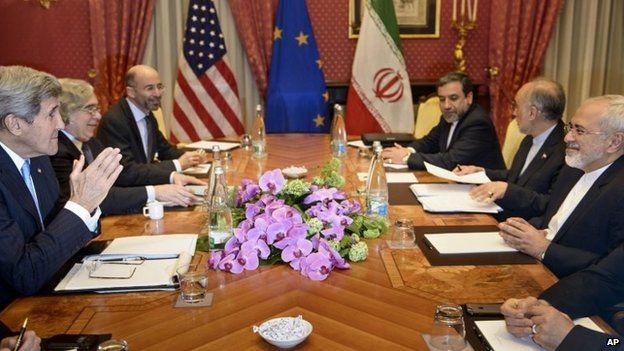Iran nuclear talks: World powers seek deal in Lausanne
- Published

Representatives of six world powers are intensifying talks with Iran on its nuclear programme, ahead of a 31 March deadline for a deal.
The US secretary of state and German and French foreign ministers have all cancelled their travel plans in a final push for an agreement.
Representatives from China, Russia and the UK are also at the negotiations.
US officials say all parties have agreed to a "step by step approach" to the deal, but sticking points remain.
The world powers, known as the P5+1 group - the five permanent members of the UN Security Council plus Germany - want to ensure that Iran cannot develop nuclear weapons.
Iran denies it is aiming to build nuclear weapons and is hoping that a deal will lead to the lifting of international sanctions.
Iran 'optimistic'
The talks are taking place in the Swiss city of Lausanne, with world powers meeting Iranian Foreign Minister Mohammad Javad Zarif.
US officials said all parties, including Iran, had agreed "there needs to be a phased step by step reciprocal approach", so that Iran's steps to scale back its nuclear programme are met with a phased lifting of sanctions.
Two core issues remained on the table, they said. One was how the sanctions on Iran would be lifted; the other was what would happen in later years of the agreement, including Iran's capacity to conduct nuclear research and development.
"We've put ideas on the table but we haven't found the right combination yet, but no one's given up," the officials said.
Meanwhile, senior Iranian negotiator Abbas Araqchi said his side was "optimistic, the chances of getting a deal are there."
However, he added that that talks were "in their final phase and very difficult", and ruled out sending the country's nuclear stocks abroad - one of the steps demanded by the P5+1.
UK Foreign Secretary Philip Hammond said: "We're here because we believe a deal can be done, it's in everybody's interest that a deal does get done. But it has to be a deal which puts the bomb beyond Iran's reach. There can't be any compromise about that."
US Secretary of State John Kerry cancelled a planned return to the US to attend an event honouring his late Senate colleague Edward Kennedy, to ensure he could attend Sunday's talks, the state department said.
German Foreign Minister Frank-Walter Steinmeier and his French counterpart Laurent Fabius also delayed a planned trip to Kazakhstan in order to focus on the negotiations.
They were joined by Chinese Foreign Minister Wang Yi and Mr Hammond.
At the scene: Lyse Doucet, BBC News, Lausanne
Negotiators are close, closer than ever before, in their 12-year stand-off over Iran's nuclear programme. But a deal is still not done, and no-one can say with 100% certainty if it will be.
With each day that slips by before an end-of-March deadline for a framework agreement, the political temperature rises against the serene backdrop of the snow-capped Swiss Alps. As foreign ministers and officials stream in and out of meetings in the gilded Beau Rivage, snippets and statements to the persistent press play into 11th-hour brinkmanship.
The last difficult details are as much about political power as they are about nuclear energy. Both Iran and world powers urge the other side to make tough decisions. All say they've come here, hoping to make a deal, to make history.
Beyond this rarefied world, sceptics wait in many capitals, ready to react if, in their view, a bad deal emerges. Reaching what counts as a "good deal" for all will go right down to the wire and, possibly, beyond.
Potential sticking points in the nuclear talks are thought to include how long the deal will last and how much of Iran's nuclear facilities will be open to inspection.
Meanwhile, Israel's Prime Minister Benjamin Netanyahu has again warned against a deal with Iran, describing it as worse than his country had feared.
On Sunday he told a cabinet meeting "this deal, as it appears to be emerging, bears out all our fears, and even more than that".
He gave no details, but noting advances by Iran-backed forces in Yemen and other Arab countries, he accused Iran of trying to "conquer the Middle East" while pursuing nuclearisation.
"The Iran-Lausanne-Yemen axis is very dangerous to humanity and must be stopped," he said.